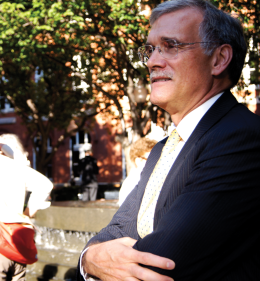
university.
NATALIA ORTIZ FOR THE HOYA
Now in his sixth week as Georgetown’s provost, former Director of the U.S. Census Bureau Robert Groves sat down with The Hoya to discuss his hopes for the university and goals for the year.
What are your aims for this academic year?
They are derivative of larger university goals. My job is to worry about the quality of faculty and academic programs. … I have to worry about the education [the students] are getting, recruiting good faculty and making sure the programs are up-to-date and high quality. A lot of the goals are keeping that going, making sure that program reviews are going on and that we are getting outside critiques of how well we are doing. I also make sure that we have rigorous reviews of … the faculty, especially for tenure decisions, which are very important decisions that we worry about. … I want to make sure we keep doing as well as we have been doing. The other goals are longer-term ones that I won’t finish in a year. … [The long-term goals] have to do with making sure that the way we educate both undergraduate and graduate students utilizes the best methods we can. Many universities, including Georgetown, are deliberating on how we can use new technologies in the classroom to make it faster for [students] to learn things, give [them] more time with faculty for intense interactions.
Why did you choose to become Georgetown’s provost after your time organizing the 2010 Census?
I am an academic at heart. I’ve taught at the University of Michigan, started mainly graduate programs and done research for a long time … and then I had this stint as a presidential appointment in the Obama administration … so going back to a campus was just a natural thing for me. I realized I missed being around students deeply. It is something that I learned about myself more from being away from them than being with them. I wanted to get back to campus.
Georgetown is special on a variety of dimensions that make it an important attraction. One is, I have a firm belief that the next few years at a university are going to be the most exciting years in my life. There are massive changes going on in the world that universities have to adapt to. They can’t be ignored. How Georgetown will look 20 years from now, I think, will really be shaped over the next few years. … It really is a matter of a small number of years that will seal the future of Georgetown, and … I want to be involved.
I really believe that the undergraduate and graduate student experience has to be a much more original discovery of knowledge and research-based, because we are all going to be researchers. We won’t call ourselves researchers, but that is how we are going to live our [lives] in the future. This involves an integration of the academic side and the teaching side and the research side of universities. This has sometimes been confused as [conflicting], but I view these as different parts of the same beast. And then how we have to adapt new technologies to the new pedagogy. I wanted to be a part of that, and if you think of both those things, Georgetown has been involved in a discussion about them. Here was an institution that seemed ready … to move on them, and that’s very exciting to me.
What do you see as your role in Georgetown’s long-term future?
Georgetown is ready to be a much more prominent research university. It has a lot of the ingredients for this, so one of my jobs has to be to find out what the structure and the appointment process and the administrative procedures that will facilitate world-class research. So that’s clearly a front-burner issue for this office. We have to get this right, and there is work to be done on it. And then the second thing is related to that. Part of the answers to this will force us to talk about the next round of undergraduate and graduate programs as well. … These are big things that will end up determining what the Georgetown of 20 years from now will look like. Most of my thoughts are on that.
What inspired you to start a blog? What is the blog’s purpose?
The blog is really for me to float ideas and to address an issue of what’s going on on campus: What [is the administration] talking about? What are they planning? I want it to be a way to make things more transparent, and I want it to be a dialogue. We will start, soon, a dialogue about the use of technology in classrooms, and I want students and faculty to be a part of that dialogue. I’ll use the blog to remind people about how they can participate.
How will you respond to student feedback on your blog?
What I’m looking for are ones that start expanding the point, especially ones that are controversial. … Usually when that happens, there is something worth thinking about. If people are having divergent viewpoints, that is really important for me to know. My hunch is rather than jumping into the comment stream … I may do another blog that’s stimulated by the stream of comments. I don’t want to squelch any of the commentary. … I don’t want to be the arbiter of the comments.














